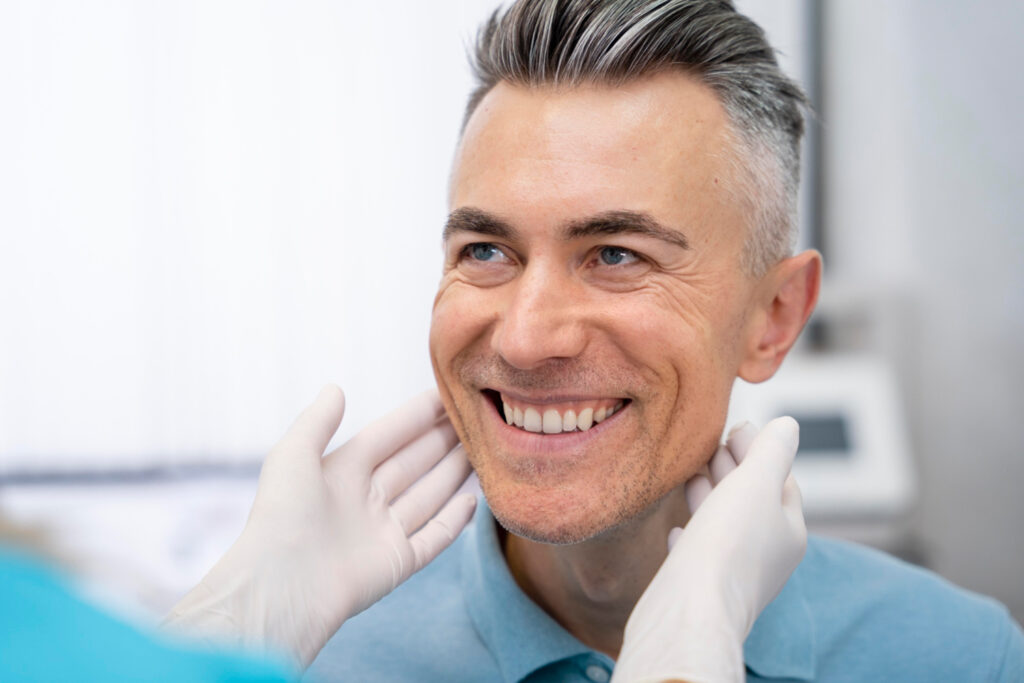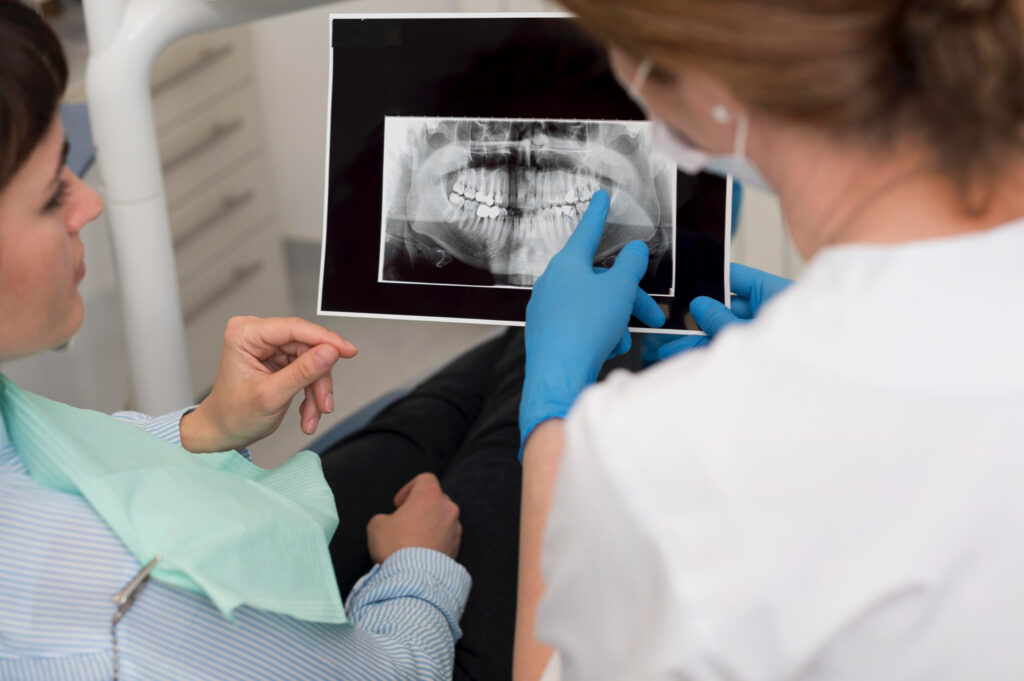(801) 212-9061
7555 Center View Ct Suite 104 West Jordan, UT 84084
Corrective Jaw Surgery in West Jordan

Corrective jaw surgery is a specialized procedure aimed at correcting a range of skeletal and dental concerns, primarily involving the alignment of the jaw. This type of surgery not only improves the patient’s ability to chew, speak, and breathe but can also significantly enhance facial appearance.
If you believe you could benefit from Corrective Jaw Surgery, contact our office today at (801) 212-9061.
Procedures and Benefits
Corrective jaw surgery is recommended for various conditions:
- Misalignment of Jaws: Conditions like an overbite, underbite, or crossbite, which cannot be corrected with braces alone.
- Chronic Jaw Pain and TMJ Disorders: Issues that lead to pain, discomfort, and functional problems in the jaw joint.
- Facial Injury or Birth Defects: Reconstruction of the jaw following trauma or birth defects.
- Obstructive Sleep Apnea: Reducing airway obstruction to improve breathing during sleep.
The surgery involves:
- Pre-Surgical Assessment: Detailed imaging and planning using advanced technology to ensure precise corrections.
- Collaboration with Orthodontists: Often, patients may need orthodontic treatment before and after surgery for optimal results.
- The Procedure: Performed under general anesthesia, the surgeon makes incisions inside the mouth to minimize visible scarring. Bones are cut, moved, and secured with plates and screws.
Post-surgery recovery includes:
- Initial Healing Phase: Instructions on diet, oral hygiene, and activity restrictions to promote healing.
- Long-term Care: Regular follow-up visits for monitoring and adjusting the treatment plan as needed.
While improving facial appearance is a significant benefit, the primary goal of corrective jaw surgery is to enhance oral function, including improved chewing, speech, breathing, and relief of pain and discomfort.

Common Misconceptions about Corrective Jaw Surgery
Misconception: The Surgery Is Purely Cosmetic
Fact: While cosmetic enhancement is a byproduct, the primary objective is to correct functional issues related to jaw misalignment.
Misconception: Recovery from Jaw Surgery Is Extremely Lengthy and Painful
Fact: Advances in surgical techniques have significantly reduced recovery time and discomfort. Pain management and post-operative care are tailored to each patient’s needs, ensuring a smoother recovery process.
Misconception: Corrective Jaw Surgery Is a Last Resort Treatment
Fact: It’s a strategic treatment option for specific conditions where other interventions (like orthodontics alone) might not be effective.
Corrective jaw surgery is a valuable procedure that not only enhances facial appearance but more importantly, addresses significant functional challenges related to jaw alignment.
If you’re experiencing issues that may require corrective jaw surgery, contact our office (801) 212-9061.
Frequently Asked Questions
Corrective jaw surgery, also known as orthognathic surgery, is a procedure performed to correct a range of skeletal and dental irregularities, including the misalignment of jaws and teeth. Patients who may need this surgery include those with difficulty chewing, biting, or swallowing, speech problems, chronic jaw or TMJ pain, excessive wear of the teeth, open bite, protruding jaw, or breathing problems. These issues often cannot be resolved with braces alone.
The need for corrective jaw surgery is typically determined through a comprehensive evaluation, which includes dental and facial X-rays, a physical examination, and sometimes 3D imaging. Our dentist or orthodontist will collaborate with an oral and maxillofacial surgeon to develop a treatment plan.
Corrective jaw surgery involves repositioning the jawbones according to the specific needs of the patient. This may include cutting and moving bones in the upper jaw, lower jaw, chin, or a combination of these. The surgery aims to improve the patient’s ability to chew, speak, and breathe and to enhance facial appearance.
The surgery is performed under general anesthesia, so there is no pain during the procedure. Post-surgery, patients can expect some discomfort and swelling, which can be managed with medication. Your surgeon will provide detailed post-operative care instructions.
Recovery from corrective jaw surgery varies by individual and the complexity of the surgery. Initial healing typically takes about six weeks, while complete healing can take up to 12 months. Patients usually return to work or school within 2-3 weeks post-surgery, but physical activities should be limited for up to six weeks.
Since the surgery alters the alignment of the jaw, it can result in noticeable changes in your facial appearance. The extent of this change depends on the specifics of the surgery but is generally viewed positively in terms of aesthetic outcome and improved function.
Like all surgeries, corrective jaw surgery carries risks, such as infection, bleeding, nerve injury, or the need for further surgery. However, these risks are relatively rare, and the surgery is generally safe when performed by an experienced oral and maxillofacial surgeon.
Preparation may include orthodontic treatment before surgery, maintaining good oral hygiene, quitting smoking, and following specific pre-surgery instructions regarding eating, drinking, and medication. Your surgical team will provide detailed guidelines.
The long-term outlook after corrective jaw surgery is typically very positive, with improvements in oral function, comfort, and appearance. Ongoing care from our dental team and adherence to post-operative guidelines are essential for the best outcome.
Coverage for corrective jaw surgery varies depending on your insurance plan and the reasons for the surgery. If the surgery is deemed medically necessary, it may be partially or fully covered. It’s important to consult with your insurance provider to understand your coverage.
BOOKING HOURS
M 8AM–5PM | Tu 8AM–5PM | Wed 7AM–6PM | Th 8AM–5PM | Fr 8AM–5PM
We are OPEN for ALL dental care procedures and emergency needs. Protecting the health and safety of our patients, families, and team members remains our number one priority.
Free $50 Gift Card*
$50 Gift Card when you complete an appointment with us!
*Redeemable after completed paid treatment. Must be a new patient to our organization and must not have been seen in ANY OF OUR LOCATIONS. The patient will receive a gift card via email or SMS after completion of their appt.
Free Exam & X-ray^
For New Patients without insurance we offer Free Exam and X-rays!
^For New Patients that do not have dental insurance. New patients must be 18 or older to receive free exam and x-rays. Discounts cannot be combined with other offers or dental discount plans. Additional fees may be included in individual cases.
$99 Hygiene Visit^^
For New Patients without insurance we offer Free Exam and X-rays!
^^For new patients without dental insurance. Includes Exam, X-Ray and Routine Cleaning. A Periodontal Cleaning requires additional fees, and rescheduled for further treatment. Cannot be combined with other offers or dental discount plans.

